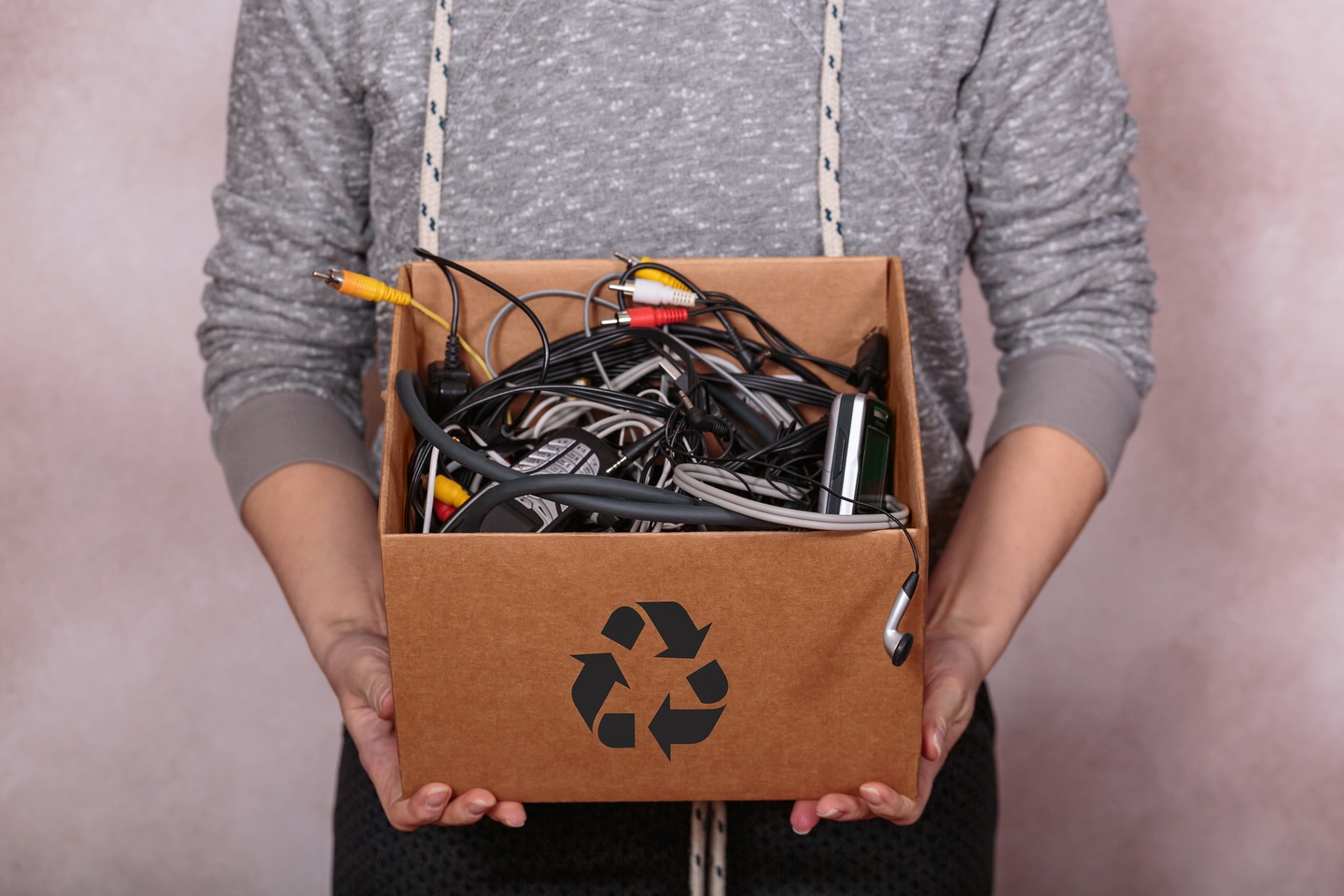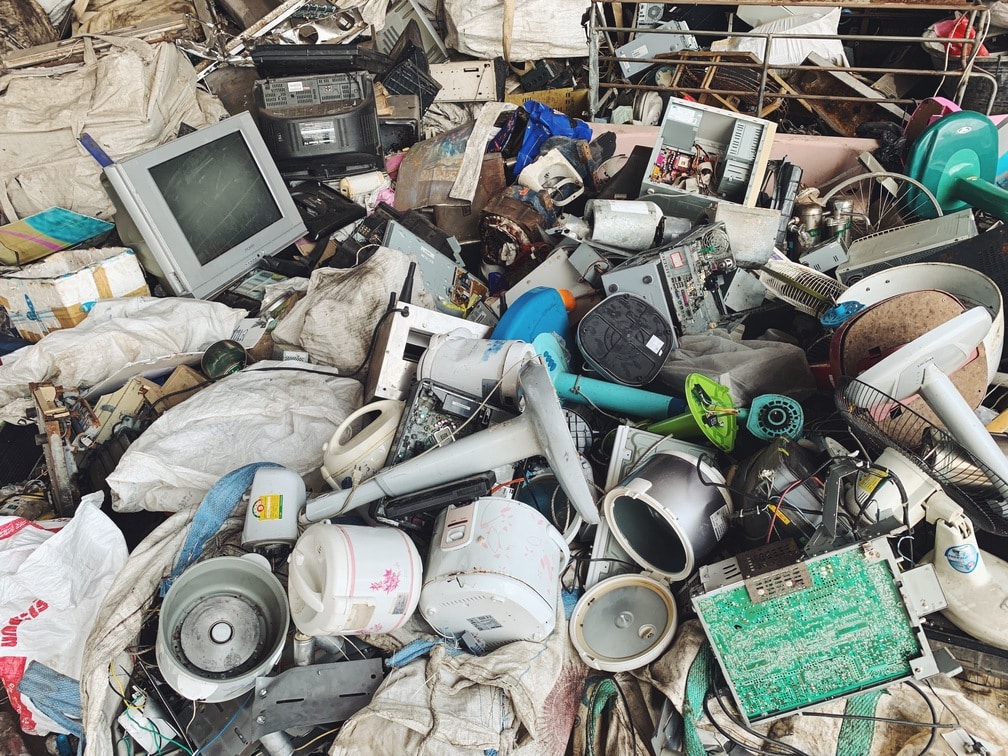Waste & material traceability solution for sustainable facilities

Electronic waste has become one of the world’s fastest-growing waste streams. Recent data from the Global E-waste Monitor reveals alarming statistics: the world generated 62 million tonnes of e-waste in 2022, equivalent to 7.8 kg per person annually. This figure is projected to reach 82 million tonnes by 2030, making 2025 a critical year for implementing effective management strategies.
What’s more concerning is that e-waste generation is rising five times faster than documented recycling rates. Only 22.3% of global e-waste was properly collected and recycled in 2022, leaving the majority improperly disposed of in landfills or illegal dumping sites.

Electronic devices contain both hazardous materials and valuable resources. When improperly disposed of, substances like mercury, lead, and cadmium contaminate soil and groundwater, while toxic gases released during burning expose workers and communities to serious health risks. In regions like Guiyu, China, which processes nearly 70% of the world’s e-waste, children have suffered developmental issues and workers face lead poisoning and cancer.
Beyond environmental and health concerns, improper e-waste disposal represents a massive economic loss. According to the EPA, every million discarded cell phones contain 35,000 pounds of copper, 772 pounds of silver, and 75 pounds of gold that could be recovered and reused.
Effective e-waste management follows a systematic approach starting with collection through various schemes including doorstep pickup, retailer take-back programs, and specialized collection events. Once collected, devices are assessed to determine which components can be reused versus recycled.
The recycling process involves shredding electronics into smaller pieces, then separating materials using magnets and water separation technology. Ferromagnetic metals, non-ferromagnetic metals, plastics, and glass are sorted accordingly. The final step involves extracting remaining metals from plastic components before preparing materials for sale as raw materials for new electronics manufacturing.
Learn more about e-waste by downloading our comprehensive ebook on E-Waste Management and Recycling.
As we move through 2025, 78 countries have established e-waste management policies covering 71% of the global population, yet there is still a long way to go.Effective e-waste management requires comprehensive regulatory frameworks, public awareness campaigns, and Extended Producer Responsibility (EPR) systems that ensure manufacturers take accountability for the entire lifecycle of their products.
Evreka supports this transformation through its Evreka360 platform, providing end-to-end visibility, data-driven insights, and compliance tools that help organizations align with evolving global e-waste regulations.
Technology plays a crucial role in modern e-waste management — from smart tracking systems and optimized collection routes to advanced recycling operations. Digital platforms enable real-time monitoring of collection containers, efficient fleet coordination, and stronger customer engagement across urban and industrial networks.
With its MRF (Material Recovery Facility) Management Module, Evreka360 empowers recyclers and e-waste processors to digitalize every stage of material handling — from sorting and weighing to performance tracking — ensuring regulatory compliance, operational efficiency, and measurable sustainability outcomes.

Singapore exemplifies successful e-waste management through its Zero Waste Master Plan, which aims for a 70% recycling rate by 2030. The city-state’s partnership with ALBA E-Waste demonstrates how circular economy principles can be effectively implemented on a national scale.
As the appointed Producer Responsibility Scheme (PRS) operator, ALBA provides free doorstep collection island-wide, manages a network of strategic collection points, and has developed the ALBA STEP UP app to make recycling more accessible for citizens.
This holistic approach has achieved extensive coverage across residential areas and led to a significant reduction in improper disposal — setting a strong benchmark for other nations aiming to implement circular e-waste systems.
Behind the scenes, Evreka provides the digital backbone of Singapore’s e-waste ecosystem.
Through the Evreka360 platform and its MRF (Material Recovery Facility) Management Module, ALBA’s end-to-end collection and treatment operations are fully digitalized and connected. Real-time tracking, data analytics, and smart sensors enable total operational visibility across the island.
“Evreka helps us to digitize the entire e-waste collection and treatment process in Singapore. With their solutions, we are able to seamlessly oversee our various collection channels and operations on a single platform. Thanks to Evreka’s high-tech sensors and tracking system, inefficiency and operational costs are minimized, thereby enhancing our capabilities. We have integrated these solutions into our operations within our Material Recovery Facilities (MRFs) and have already achieved a significant improvement in performance at each stage. By seizing all the technological advantages provided by Evreka, we aim to be at the forefront of building the smartest cities in the world.”
— Thomas Mattscherodt, Head of Project Management Office, ALBA E-Waste Singapore
Through this collaboration, Singapore’s e-waste management system has become a global reference point for digital circularity — combining data intelligence, smart logistics, and sustainability in one integrated ecosystem.
Discover how Evreka’s digital solutions are powering Singapore’s circular economy and transforming e-waste management efficiency: Download Case Study
Ready to achieve the same transformation? Start your digital journey today — request a personalized demo and see how Evreka360 can help you build smarter, more sustainable waste and recycling operations.